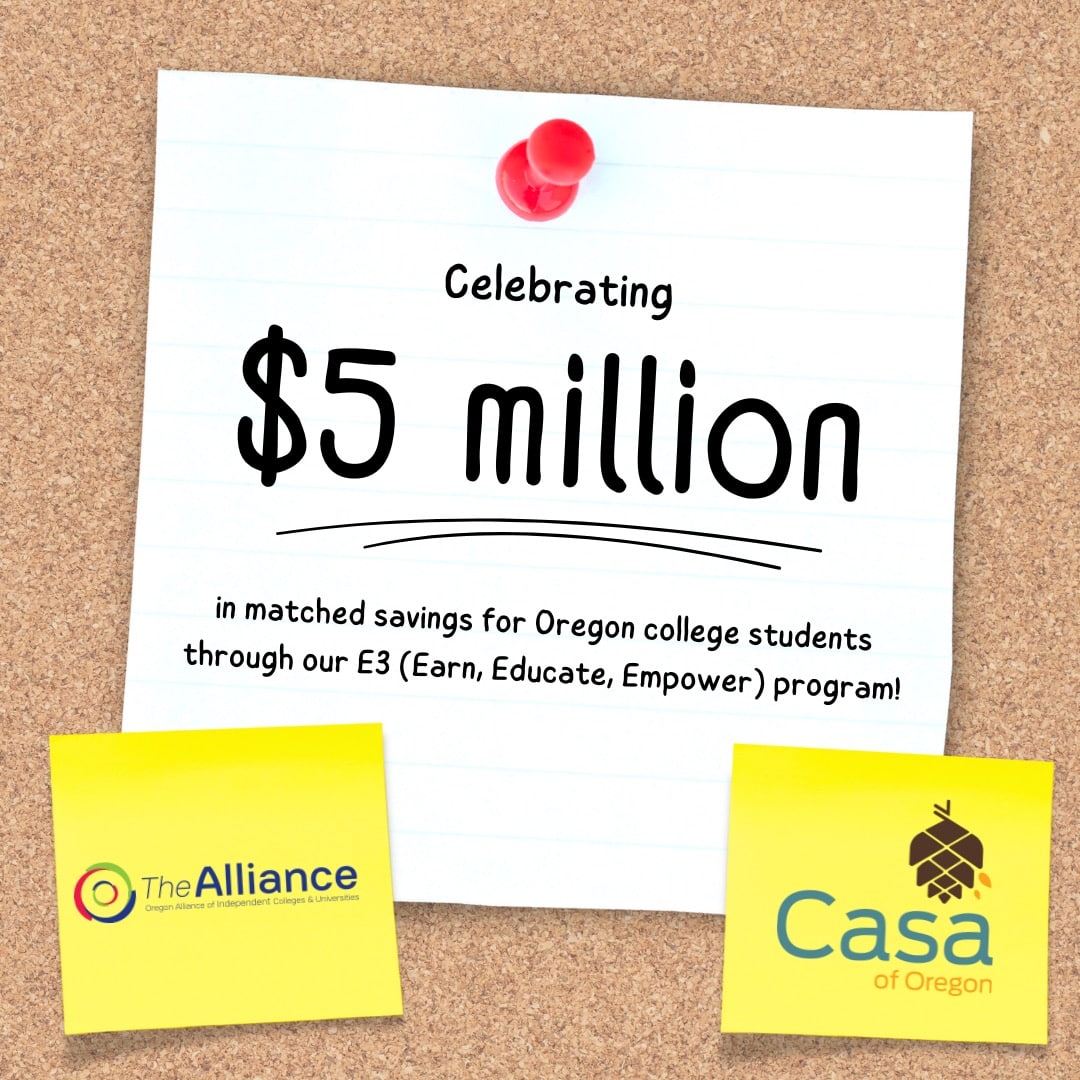We are excited to announce that we, in partnership with The Oregon Alliance of Independent Colleges and Universities (The Alliance), have provided over $5 million in matched savings funds to college students in-need since 2009. $5 million!
Through the current program, under-resourced, low-income, and first-generation Oregonians are able to save for their educational goals–and have those savings matched 6:1. That means that students’ hard-earned dollars go six times as far!
To date, 870 students at Alliance member institutions have participated in The Alliance Education IDA program. The aggregate total of participating students’ savings to date is nearly $900,000, and the total matches tendered to the member colleges on these students’ behalf is now over $5 million.
“We are thrilled to have reached this important milestone,” said Brent Wilder, President of the Oregon Alliance of Independent Colleges and Universities. “To think that a program could grow so large from something so small is a testament to our longstanding and close partnership with CASA of Oregon, as well as the tremendous need for educational support that exists throughout our state.”
Rebekah Bassett, CASA of Oregon’s Director of the Family Economic Opportunity Program, said she “was over the moon” when she heard that the program had reached the $5 million mark.
“This achievement reflects the incredible strength of community partnerships, and the tenacity of young people determined to realize their dreams,” said Bassett. “I can’t think of a better way to celebrate this milestone than to celebrate all of the students that have passed through this program. They are our doctors, our accountants, our writers, and I am grateful that we were able to invest in their futures.”
CASA of Oregon is now in its 15th year partnering with The Alliance to make matched college savings accounts available to income-eligible students attending participating independent, non-profit colleges or universities. Our first program, the Matched College Savings Program (MCSP), served 341 students. MCSP provided educational, career, and financial counseling, and was funded in part by the U.S. Department of Health and Human Services Assets for Independence program and The Alliance.
Today, our new program, dubbed E3 (Earn, Educate, Empower), is funded by the Oregon IDA Initiative and The Alliance, and serves up to 180 students annually with funding and financial education.
Wilder began working with The Alliance in 2005, and still clearly remembers the day he first heard about matched savings accounts, commonly known as Individual Development Accounts, or IDAs. “It was about 5 o’clock the day before the Fourth of July holiday in 2007,” said Wilder. “A colleague from a national organization reached out to me and said she had something to run by me. She described what an IDA was, and I said, ‘I love the concept, I’m intrigued.’”
“She said that there was an organization in Oregon doing a lot of creative work around IDAs, and that they were looking to grow,” says Wilder. “Turns out the organization was CASA of Oregon.” Shortly thereafter, a collaboration was born.
In the early days, Wilder said, many viewed the program with skepticism. Wilder began by reaching out to financial aid directors who were accustomed to Department of Education nomenclature around financial aid: For them, this program was “out of the box.” Similarly, when the groups began meeting with students, some thought the program was too good to be true and that it was a “scam.”
The first cohort of savers consisted of 10 to 15 students. Soon after, the demand for this program surged. According to Wilder, “we went from 30 or 40 students a year and then all of a sudden reached around 150 students.” The university financial aid offices found themselves unable to do the case management. CASA of Oregon stepped in to handle the administration of the funds and the financial education, and has been doing so ever since.
Hector Martinez has served as CASA’s E3 Program Manager since 2018. In this capacity, Martinez recruits students for the program, and coaches them and their families through the application process and opening a bank account. Martinez also supports students as they save, and ensures that each student in the program receives financial and asset-specific education.
The first in his family to graduate from college, Martinez wanted to ensure students had financial guidance and didn’t take on too much debt during college.
“Helping students get a good education and avoid going into debt is what drew me to this work and what has kept me here so long,” said Martinez. “I get to give people money. I get to help folks start that process of building generational wealth by preventing them from having generational debt. This is huge.”
“We give people money. There are so many things that are pulling people’s money out of their wallets, and we’re one of the few legitimate resources that will actually put money into people’s wallets” says Martinez. “In this day and age when the cost of living is skyrocketing and the middle class is shrinking, being able to graduate from school and not be in debt is amazing.”

